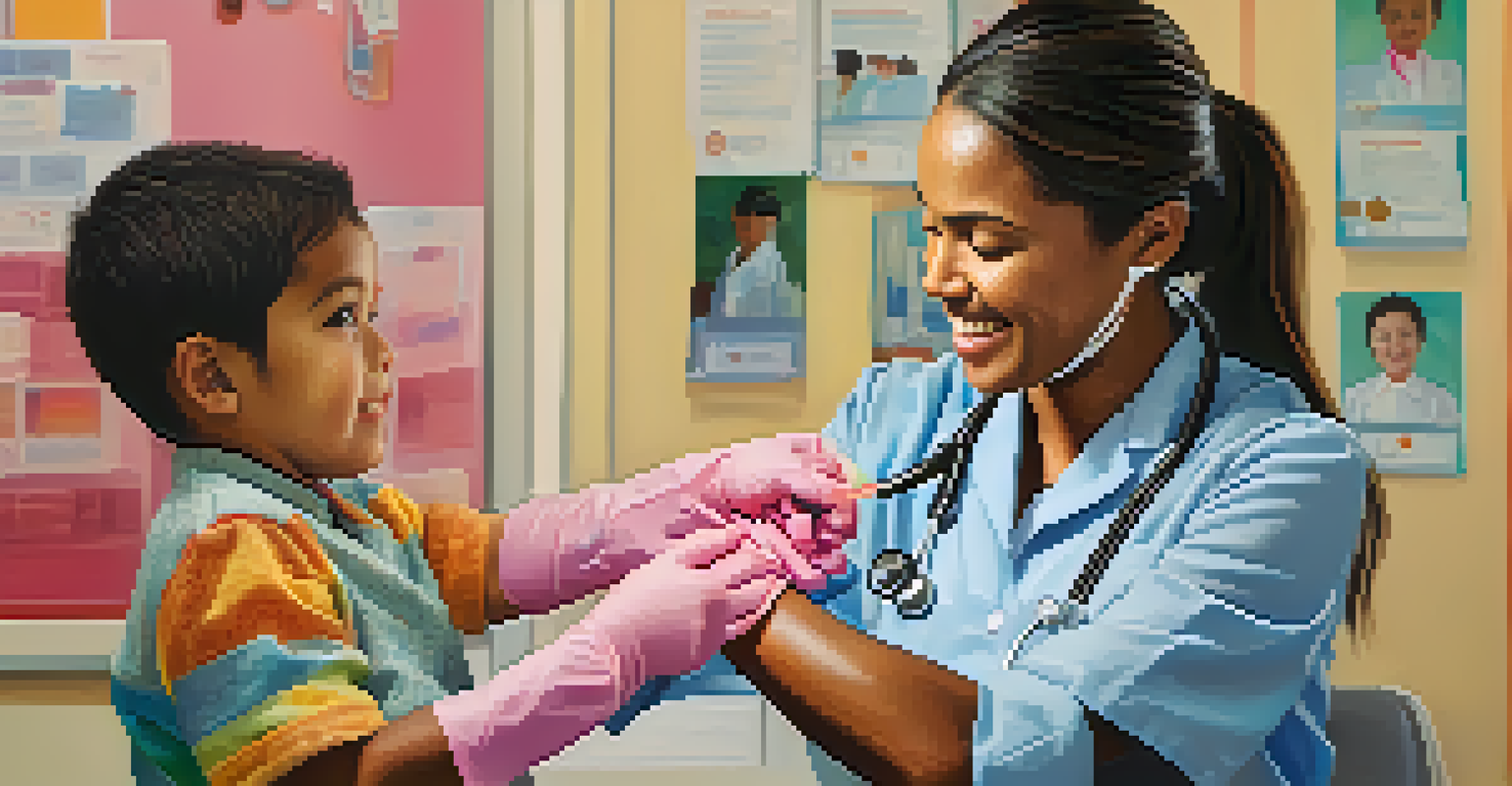The Impact of Vaccination Programs on Colorado Communities

Understanding Colorado's Vaccination Landscape
Colorado has a rich history of vaccination programs that have significantly impacted public health. From the introduction of childhood vaccines to adult immunizations, these programs play a critical role in disease prevention. The state's commitment to vaccination is evident in its efforts to educate communities about the benefits of immunization.
Vaccination is the most effective way to prevent infectious diseases and protect our communities.
One key aspect of Colorado's vaccination landscape is the collaboration between public health agencies and local communities. Health departments work alongside schools, clinics, and nonprofit organizations to promote vaccination awareness. This partnership has been instrumental in reaching diverse populations and ensuring vaccination access for all.
Additionally, Colorado has made strides in increasing vaccination rates, particularly during outbreaks of diseases like measles and whooping cough. Campaigns that emphasize the importance of herd immunity have helped protect those who cannot be vaccinated, such as infants and individuals with certain health conditions. These efforts highlight the community-centric approach to public health in Colorado.
The Role of Vaccination in Disease Prevention
Vaccination is one of the most effective tools for preventing infectious diseases. In Colorado, vaccination programs have led to a marked decline in diseases that once posed significant public health threats. For instance, the incidence of diseases like rubella and polio has drastically decreased due to widespread vaccination efforts.

Preventing outbreaks not only protects individuals but also alleviates the burden on healthcare systems. Fewer cases mean less strain on hospitals and medical professionals, allowing them to focus on other health issues. This ripple effect enhances the overall health landscape of Colorado communities.
Community Collaboration Boosts Vaccination
Partnerships between public health agencies and local organizations enhance vaccination access and awareness across diverse populations in Colorado.
Moreover, vaccination contributes to economic stability by reducing healthcare costs associated with treating preventable diseases. Families can save on medical bills and lost wages when they are protected from illnesses. This economic benefit underscores the multifaceted impact of vaccination programs on Colorado's communities.
Improving Public Health through Education
Education plays a pivotal role in the success of vaccination programs. In Colorado, health departments prioritize community education initiatives that inform residents about the importance of vaccines. These programs aim to dispel myths and misconceptions about vaccination, fostering a more informed community.
Immunization is one of the most cost-effective health interventions. It saves lives and protects families from financial hardship due to illness.
Schools are also key players in vaccination education. By providing resources and information to parents and students, schools help create a culture of health and safety. Schools often host vaccination clinics, making it easier for families to ensure their children are up-to-date on required immunizations.
Additionally, community outreach programs use social media and local events to engage residents. By sharing personal stories and testimonials from vaccinated individuals, these campaigns create a sense of connection and trust. This approach not only informs but also inspires communities to participate in vaccination programs.
Addressing Vaccine Hesitancy in Colorado
Vaccine hesitancy remains a challenge in many communities, including Colorado. Some individuals may have concerns about vaccine safety or effectiveness, leading to lower vaccination rates. Addressing these concerns requires a compassionate and understanding approach from healthcare providers and public health officials.
Efforts to combat vaccine hesitancy often involve one-on-one conversations where healthcare providers listen to patients’ concerns and provide evidence-based information. This personalized approach helps build trust and encourages individuals to make informed decisions about vaccinations.
Education Reduces Vaccine Hesitancy
Educational initiatives that address misconceptions about vaccines are crucial for fostering informed communities and increasing vaccination rates.
Community leaders also play a crucial role in addressing hesitancy by promoting vaccination as a community value. When respected figures advocate for vaccines, it can shift perceptions and motivate others to get vaccinated. This collective effort is vital for achieving higher vaccination rates across Colorado.
The Impact of Vaccination on Vulnerable Populations
Vaccination programs are especially important for protecting vulnerable populations, such as children, the elderly, and those with compromised immune systems. In Colorado, targeted efforts ensure these groups receive timely vaccinations to reduce their risk of serious illness. This focus helps create safer environments for everyone in the community.
For instance, immunizing children against diseases not only protects them but also safeguards classmates and teachers. By achieving high vaccination rates in schools, Colorado can minimize the spread of contagious diseases, fostering a healthier educational environment for all students.
Furthermore, outreach programs specifically designed for the elderly and those with chronic health conditions help ensure they receive necessary vaccinations. By addressing barriers such as mobility or access to healthcare, these programs exemplify how vaccination initiatives can effectively support vulnerable populations.
Long-Term Benefits of Vaccination Programs
The long-term benefits of vaccination programs extend beyond immediate disease prevention. In Colorado, consistent vaccination efforts contribute to the overall resilience of the healthcare system. By preventing outbreaks, these programs allow healthcare providers to focus on other pressing health issues, resulting in better care for all.
Moreover, as vaccination rates increase, communities experience a collective sense of safety and well-being. Parents can send their children to school with confidence, knowing that they are protected from preventable diseases. This peace of mind is invaluable and fosters a positive community atmosphere.
Vaccination Protects Vulnerable Groups
Targeted vaccination efforts help safeguard vulnerable populations, such as children and the elderly, from serious diseases and contribute to overall community health.
Additionally, the economic benefits of vaccination programs cannot be overstated. By reducing the incidence of disease, Colorado can save on healthcare costs associated with treating outbreaks. This financial relief allows for reallocation of resources to other vital community services, enhancing overall quality of life.
Looking Ahead: The Future of Vaccination in Colorado
As we look to the future, the importance of vaccination programs in Colorado remains clear. Ongoing efforts to educate the public and address vaccine hesitancy will be crucial for maintaining high vaccination rates. Adaptability in response to emerging health threats will also play a key role in shaping future vaccination strategies.
Innovations in vaccine development and delivery methods are on the horizon, promising to make vaccinations more accessible. Mobile clinics, for example, could reach remote areas, ensuring that all Coloradans have the opportunity to be vaccinated. Such advancements can significantly enhance public health initiatives.

Ultimately, the collective commitment of communities, healthcare providers, and public health officials will determine the success of vaccination programs in Colorado. By working together, we can create a healthier future, free from the burden of preventable diseases.